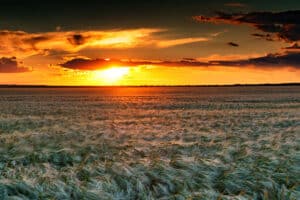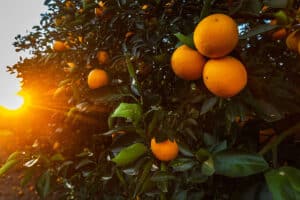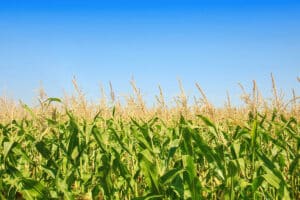Several months ago I wrote about farmland investing, and I recently picked up a book titled Investor’s Guide to Farmland written by Greyson S. Colvin and T. Marc Schober. Their book has reinforced my position on the topic with a much broader and detailed analysis of how and why farmland investing can be a good investment strategy. In May of 2012, Jim Rogers, the well-known Wall Street Investor, was quoted in Forbes predicting that in the future the stock brokers will be driving taxis and the smart farmers will be driving Lamborghinis. To this point, my recent reading has brought forward a few notable points about evaluating farmland as a qualified investment vehicle. This article will focus on the following four points:
- Farmland is a hedge against inflation and can help maintain wealth.
- One unit (acre) can increase in value over time as agricultural productivity increases or evolves into new practices.
- Farmland offers diversification of a portfolio with returns that are close to stocks but with similar risk levels of bonds.
- Farmland has not been institutionalized into a scalable market, place and management of asset is generally easier to own and manage.
1. Just last week a client told me the bond market cost him a bunch of money. The bond market will suffer in an inflationary marketplace. We are looking at more farmland to buy to maintain existing wealth for the long term. Land is a tangible asset with transitional qualities and unlike many investments it cannot be downgraded to zero as can many paper assets. It will not simply evaporate into “the market”, and after a bad day of trading you can still go take a walk on it. By transitional qualities, land use continues to evolve, and while today the land’s highest and best use may be to produce food or fiber, years from now it may better serve as parkland, residential housing, or energy production as a solar farm. Farmland is adaptive and any asset which can absorb a changing economic landscape is coveted and valuable. Because of the adaptive nature of farmland, it is not subject to the vast array of economic forces both domestically and foreign creating volatility in many other asset classes.
Recognize this lack of volatility also tends to make it slow to increase in value, as average land appreciation rates of 2 to 5 percent annually provide slow but steady long term returns. In addition to a steady rate of appreciation, farmland rents provide another source of income to increase overall annual returns and together with average rates of appreciation, fully annualized returns on farmland can be 10 percent as an asset class. Farmland rents are directly dependent on soil quality and irrigation requirements associated with the land. As water resources and irrigation are added to the land rent will increase for the property. The tangible and transitional nature of farmland adds to its value as a tool to mitigate risk against inflation and protect your money.
2. An acre of land can increase in value as agricultural productivity increases in efficiencies through technology improvements. Farmland investing is a strategy to own commodities as well as an investment in the global food system. Many economists recognize the spike in commodity prices for grain in the world and that global reserves of grain are at all-time lows. While a number of factors have contributed to this fact such as the ethanol mandate in the US (almost 40% of our nation’s corn crop goes to ethanol production) there are also pressures from growing human populations around the world.
For instance, in countries such as China and India an emerging middle class is consuming an improved diet. There is considerable growth in the amount of meat being consumed in these markets yet the rest of the world, according to Time Magazine, has a long way to go before they catch up with the average American who consumes more than 250 pounds of meat a year. This matters considerably because the majority of small grain serves to feed cattle, so as emerging countries increase consumption additional grain will be required to meet this need.
A recent ad campaign produced by agribusiness Monsanto Co. suggested that farmers will have to produce more grain in the next 50 years than farming all together has produced for the past 10,000 years. These soaring predictions are supported by the fact that net farm income in the United States, according to the United States Department of Agriculture, was expected to reach over $97 billion in 2012. Together these data points support this asset class as being an investment worth considering.
3. Farmland offers diversification in a portfolio with returns similar to stocks but a risk profile closer to bonds. Jeanne Bernick, Top Producer Editor writing on Agweb.com offered an article in August of 2012 entitled Which is the better Investment: Stocks or Farmland. In the article it reported that over the past decade U.S. farmland has returned an average of 15.5% a year, per the National Council of Real Estate Investment Fiduciaries. That compares with about 4.1% for the Standard & Poor’s 500 stock index and about 1.8% for 90-day government bonds. Gold is returning about 19%. While there is evidence supporting the performance of farmland returns over stocks, the fact is these asset classes are wildly different and should be considered in context as a part of a strategy for managing investments that are in line with an individual’s goals.
4. Farmland is not an institutionalized traded asset, yet it can be less intensive financially and in terms of time than other real estate investments. As an arguable downside, farmland is not easily purchased as the market lacks efficiencies of other investments like stocks and bonds or investment grade real estate. The inefficiencies of the farmland market adds to its value as the stability of land value is in part attributed to its lack of immediate response to more volatile financial market places. Investing in farmland requires a different skill set and management understanding but as with any asset class there are always knowledge barriers to mastering the financial aspects of the product type. This is where good advisors play a critical role. I might know one if you want to talk. A meeting can be easily arranged.
This barrier to entry in this marketplace can also be viewed as an advantage as those with the knowledge base and the advisory services on the team will be well positioned to capitalize on the returns farmland can produce. An additional plus on the financial balance sheet of farmland is the low carrying cost of ownership. Primarily, agricultural land costs will consist of taxes, land management, and maintenance. These costs are vastly different than some investment grade real estate assets that require greater investment in building maintenance and upgrading to keep the improvements of a property competitive in the marketplace.
In summary, farmland is a tangible investment based on current and predicted growth in human consumption utilizing a finite landscape of land resources to grow food. In today’s context of pensions investing billions of dollars in investment grade agriculture and foreign investors like the Chinese currently pursuing ownership of Smithfield Foods, the large sums of capital continue to seek entry into agriculture. There are a number of directions and levels to take when investing in farmland and one does not have to be a $20 billion investment fund in order to buy farmland as an investment. As a local resource in the land brokerage community I welcome the opportunity to discuss the more than 12,000 acres of land inventory I am currently brokering in Maryland, Delaware and Virginia. Call me today to set up an advisory interview to see how I might help you with your land goals.
This content may not be used or reproduced in any manner whatsoever, in part or in whole, without written permission of LANDTHINK. Use of this content without permission is a violation of federal copyright law. The articles, posts, comments, opinions and information provided by LANDTHINK are for informational and research purposes only and DOES NOT substitute or coincide with the advice of an attorney, accountant, real estate broker or any other licensed real estate professional. LANDTHINK strongly advises visitors and readers to seek their own professional guidance and advice related to buying, investing in or selling real estate.









Interesting article. I am interested in purchasing land, but have hesitated because I don’t know how to generate income from it. I would be interested in talking more, but there was no number listed for me to call. Please email me. Thank you.
I figured out how to turn around and I turned around and started generating a nice living from it and I’m only 1 year into it. My crops have yet to come in yet either! Thinking about flipping it and doing it again elsewhere. Want to know more email me.
It seems to me the families that kept their property through the hard times as well as the good times are doing better in the long run than the folks who “sold the farm” I am speaking generationally. As a lifetime landowner of over 50 years, I can assure anyone that owning land can be tough. There will be times when the value is down and crop prices are down. In the long run though I can assure you it will not be me who “sells the farm”
Thanks for your interest.